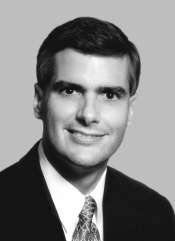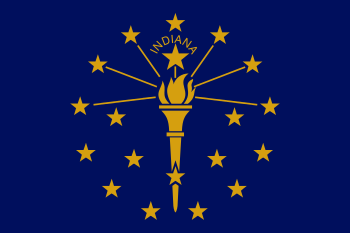David M. McIntosh
| David M. McIntosh | |
|---|---|
 | |
| Member of the U.S. House of Representatives from Indiana's 2nd district | |
|
In office January 3, 1995 – January 3, 2001 | |
| Preceded by | Phil Sharp |
| Succeeded by | Mike Pence |
| Director of the Domestic Policy Council | |
|
In office December 2, 1987 – September 8, 1988 | |
| President | Ronald Reagan |
| Preceded by | Ken Cribb |
| Succeeded by | Dan Crippen |
| Personal details | |
| Born |
David Martin McIntosh June 8, 1958 Oakland, California, U.S. |
| Political party | Republican |
| Spouse(s) | Ruth McManis |
| Alma mater |
Yale University University of Chicago |
David Martin McIntosh (born June 8, 1958) is an American attorney and Republican Party politician who served as the U.S. Representative for Indiana's 2nd congressional district from 1995 to 2001. McIntosh was the Republican nominee for Governor of Indiana in 2000, losing to Democratic incumbent Frank O'Bannon. He was an unsuccessful candidate for the Republican nomination in Indiana's 5th congressional district in 2012. In December 2014, McIntosh was named the president of the Club for Growth, a fiscally conservative 501(c)4 organization.[1]
Early life, education, and law career
McIntosh was born in Oakland, California, the son of Jean Marie (Slough), a judge, and Norman McIntosh.[2] He moved to his mother's hometown of Kendallville, Indiana, at age five after his father died of cancer.[3]
McIntosh attended Yale University, where he was a member and later president of the Yale Political Union and despite his political orientation its Progressive Party.[4] He graduated with a B.A. (cum laude) in 1980, and later received a J.D. from University of Chicago Law School in 1983.[5] He was taught at Chicago by Antonin Scalia, who later became a Supreme Court Justice.[6] He is also a co-founder of The Federalist Society.[7]
Early political career
During the Reagan Administration, McIntosh served as Special Assistant to the Attorney General and as Special Assistant to the President for Domestic Affairs.[5]
In George H. W. Bush's administration, he served as executive director of Vice President Dan Quayle's Council for Competitiveness.[8] In that role, he emphasized limiting or rolling back environmental regulations that the Council saw as inimical to economic growth[9] – such as a redraft of the Clean Air Act which would allow for companies to increase pollution emissions without notifying the public.[10]
U.S. House of Representatives
Elections
- 1994
Incumbent Democrat U.S. Congressman Philip Sharp of Indiana's 2nd congressional district decided to retire. McIntosh decided to run and won the Republican primary with a plurality of 43% in a four candidate field.[11] In the general election, he defeated Democrat Secretary of State of Indiana Joe Hogsett 54%–46%.[12]
- 1996
He won re-election to a second term with 58% of the vote.[13]
- 1998
He won re-election to a third term with 61% of the vote.[14]
Tenure
McIntosh fought against U.S. Senator Bob Dole to get rid of regulations within the health and food industries.[15]
After Newt Gingrich resigned as Speaker of the United States House of Representatives, McIntosh thought about running himself. He decided not to run and endorsed William Reynolds Archer, Jr.[16]
Committee assignments
He was a member of the House Oversight and Government Reform Committee and was Chairman of the House Oversight and Reform subcommittee.[17]
2000 gubernatorial election
In 2000, McIntosh ran for Governor of Indiana, but lost to incumbent Democrat Frank O'Bannon, 57 percent to 42 percent. His campaign was built around a 25 percent guaranteed property tax cut, but he never provided details on how he would accomplish it.
Post-congressional career
Since 2001, McIntosh has been a partner in the Washington law firm of Mayer Brown.[5] In 2009, he served as a political advisor to conservative lobby groups on Sonia Sotomayor's nomination to the Supreme Court.[18]
2004 gubernatorial election
He planned another run for governor in 2004, but dropped out before the Indiana Republican primary after President George W. Bush gave his support to Mitch Daniels, former Director of the White House Office of Management and Budget.
2012 congressional election
In 2012 McIntosh announced his candidacy for Congress, running in the newly redrawn Indiana's 5th Congressional district, held by then-retiring Republican incumbent U.S. Congressman Dan Burton. He was narrowly defeated in the primary by former U.S. Attorney Susan Brooks, losing to her by 1,010 votes out of over 100,000 votes cast.[19]
Electoral history
| Year | Democratic | Votes | Pct | Republican | Votes | Pct | 3rd Party | Party | Votes | Pct | ||||
|---|---|---|---|---|---|---|---|---|---|---|---|---|---|---|
| 1994 | Joe Hogsett | 78,241 | 46% | David M. McIntosh | 93,592 | 54% | ||||||||
| 1996 | R. Marc Carmichael | 85,105 | 40% | David M. McIntosh | 123,113 | 58% | Paul E. Zimmerman | Libertarian | 4,665 | 2% | ||||
| 1998 | Sherman A. Boles | 62,452 | 38% | David M. McIntosh | 99,608 | 61% | Cliff Federle | Libertarian | 2,236 | 1% |
| Year | Democratic | Votes | Pct | Republican | Votes | Pct | 3rd Party | Party | Votes | Pct | ||||
|---|---|---|---|---|---|---|---|---|---|---|---|---|---|---|
| 2000 | Frank O'Bannon | 1,232,525 | 57% | David M. McIntosh | 908,285 | 42% | Andrew Horning | Libertarian | 38,458 | 2% | ||||
References
- ↑ "Why the Club for Growth Is Changing Leadership". National Journal. December 11, 2014. Retrieved December 12, 2014.
- ↑ http://kpcnews.com/article_61373ec4-61ab-5c3a-82a6-d6b274644bb2.html
- ↑ Keith Schneider, "Administration's Regulation Slayer Has Achieved a Perilous Prominence," New York Times, 30 June 1992.
- ↑ Easton, Nina. Gang of Five: Leaders at the Center of the Conservative Crusade. New York: Simon & Schuster, 2000. P51.
- 1 2 3 Mayer Brown – David M. McIntosh
- ↑ Toobin, Jeffrey. "The Nine: Inside the Secret World of the Supreme Court". New York Times, September 23, 2007.
- ↑ Andrew Card Address Before The Federalist Society at the 2003 National Lawyers Convention
- ↑ The Buying of the President 2000 by Charles Lewis (journalist) and the Center for Public Integrity, page 315.
- ↑ Schneider, "Administration's Regulation Slayer."
- ↑ Rosenthal, Andrew "Quayle's Moment," New York Times, 5 July 1992
- ↑ http://www.ourcampaigns.com/RaceDetail.html?RaceID=747515
- ↑ http://www.ourcampaigns.com/RaceDetail.html?RaceID=28810
- ↑ http://www.ourcampaigns.com/RaceDetail.html?RaceID=29475
- ↑ http://www.ourcampaigns.com/RaceDetail.html?RaceID=30473
- ↑ Herbert, Bob (July 10, 1995). "In America; Health & Safety Wars". The New York Times.
- ↑ Seelye, Katharine Q. (November 7, 1998). "THE SPEAKER STEPS DOWN: THE OVERVIEW; FACING A REVOLT, GINGRICH WON'T RUN FOR SPEAKER AND WILL QUIT CONGRESS". The New York Times.
- ↑ http://nl.newsbank.com/nl-search/we/Archives?p_product=WT&p_theme=wt&p_action=search&p_maxdocs=200&p_topdoc=1&p_text_direct-0=0EB0F25FAF31DAD0&p_field_direct-0=document_id&p_perpage=10&p_sort=YMD_date:D&s_trackval=GooglePM. Missing or empty
|title=(help) - ↑ "GOP struggles for anti-Sotomayor message" Associated Press, July 5, 2009.
- ↑ "Former Congressman wants back into politics" Associated Press, July 5, 2009.
- ↑ "Election Statistics". Office of the Clerk of the House of Representatives. Retrieved 2007-08-08.
- ↑ "Dave Leip's Atlas of U.S. Presidential Elections". David Leip. Retrieved 2013-08-06.
External links
- United States Congress. "David M. McIntosh (id: M000481)". Biographical Directory of the United States Congress.
- Appearances on C-SPAN
- David McIntosh On the Issues
| Political offices | ||
|---|---|---|
| Preceded by Ken Cribb |
Director of the Domestic Policy Council 1987–1988 |
Succeeded by Dan Crippen |
| United States House of Representatives | ||
| Preceded by Phil Sharp |
Member of the U.S. House of Representatives from Indiana's 2nd congressional district 1995–2001 |
Succeeded by Mike Pence |
| Party political offices | ||
| Preceded by Dan Burton John Doolittle Ernest Istook Sam Johnson |
Chair of the Republican Study Committee 1999–2000 |
Succeeded by Sam Johnson |
| Preceded by Steve Goldsmith |
Republican nominee for Governor of Indiana 2000 |
Succeeded by Mitch Daniels |
| Non-profit organization positions | ||
| Preceded by Chris Chocola |
President of the Club for Growth 2015–present |
Incumbent |

